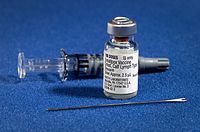
Photo from wikipedia
Adjuvants can regulate the immune response triggered by vaccines. Traditional aluminum adjuvants can induce humoral immunity, but they lack the ability to effectively induce Th1 cellular immunity, which is not… Click to show full abstract
Adjuvants can regulate the immune response triggered by vaccines. Traditional aluminum adjuvants can induce humoral immunity, but they lack the ability to effectively induce Th1 cellular immunity, which is not conducive to the development of vaccines with improved protective effects. Aluminum adjuvants from different sources may have different physicochemical properties, and therefore, completely different immune responses can be triggered. This suggests that adjuvant recognition by the immune system and its responses are closely associated with the physicochemical properties of the adjuvant itself. To test this hypothesis, in this study, we developed a new method for preparing an aluminum adjuvant. This aluminum adjuvant has a pseudoboehmite structure, strong protein adsorption capacity, and excellent suspension stability. The adjuvant was tested using the hepatitis B virus surface antigen (HBsAg) as a model antigen for immunization; the results showed that this aluminum adjuvant effectively induced not only humoral immunity but also an outstanding cellular immune response. These results provide a reference for improving the efficacy of adjuvants.
Journal Title: ACS Omega
Year Published: 2022
Link to full text (if available)
Share on Social Media: Sign Up to like & get
recommendations!